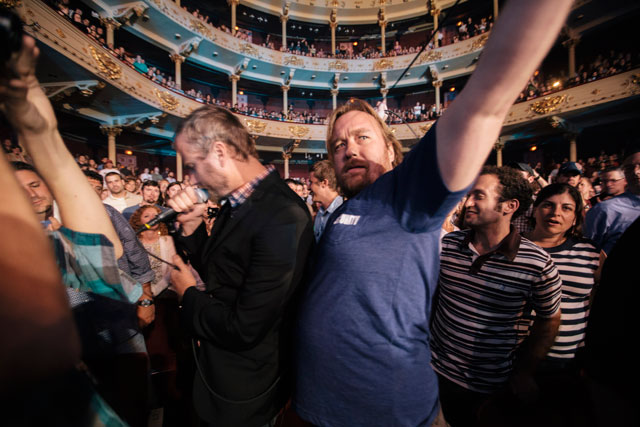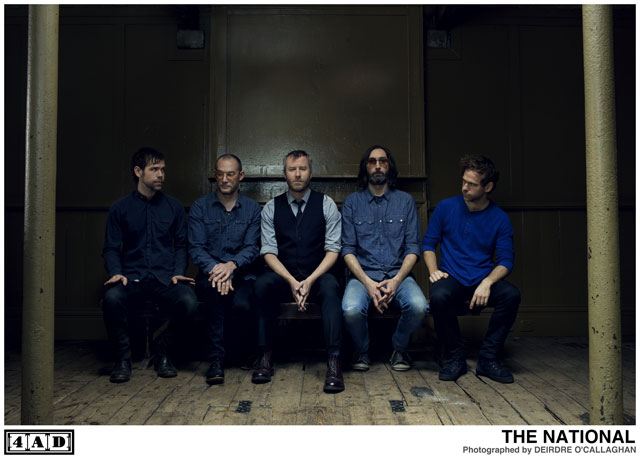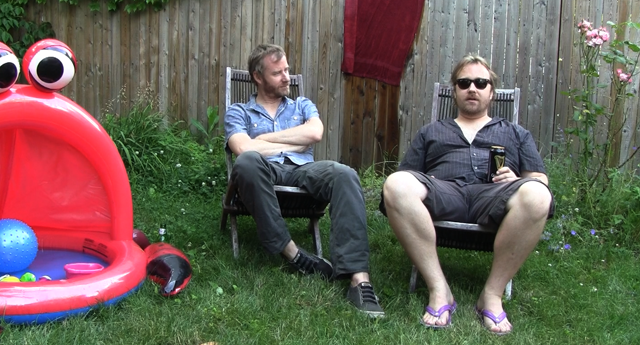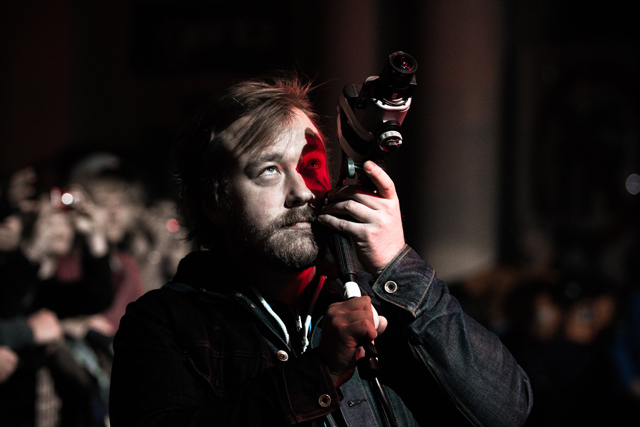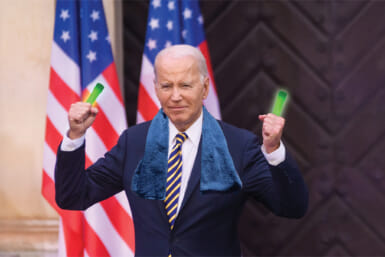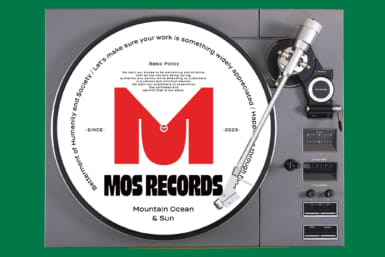Tom Berninger (right) filming his older brother’s unconventional performing style for the documentary “Mistaken for Strangers.”
I’m not alone,
I’ll never be.
Into the bone,
I’ll never grieve.
-Don’t Swallow The Cap
Matt Berninger’s toe was busted and filled with pus, but he stubbornly ambled along, shrieking all the while. Of course, pain wasn’t the source of those screams—at least not any sort of physical malady. No, they were old emotional aches that prompted not only those cries, but also the flailing leap that wrecked his foot in the first place.
By Kyle Mullin
“In the past I’ve broken toes, and just had really bad shin gashes and stuff,” Berninger, frontman of Ohio indie troop The National, says (during a phone interview with the Tokyo Weekender before the band’s headlining set at the Hostess Club Weekender on Sunday), of the injuries he’s sustained while belting out and emoting his band’s tunes. He goes on to describe his worst onstage wound: “I had to wear one of those stupid, rigid, giant blue cast shoes. This was a while ago, when we were opening for Arcade Fire. Opening for them was daunting enough, but going out with a big medical boot on is even worse.”
What frustrated him most of all was how the cast limited his mobility—he’s eager to bound onto drum kits and guitar amps, throwing his mike stand and stomping his feet in a tantrum, a sight made all the stranger by the impeccable tuxes and suits that the 42 year old sports onstage. Newcomers to The National—who shot to the alt-rock forefront after releasing the critically lauded and Billboard Top 5–charting album High Violet in 2010, followed by the equally acclaimed Trouble Will Find Me this past spring—may be shocked by Berninger’s enraged live renditions of those songs. After all, both of those recent albums are beloved for their tender, plaintive numbers. The frontman in particular has been praised for his lyrical sensitivity and the yearning everyman quality of his half-sung, half-spoken vocals on songs like “I Should Live in Salt,” “Pink Rabbits,” “England,” and especially “Vanderlyle Crybaby Geeks.”
But onstage, The National and their lead singer are far less restrained. In a review of the band’s recent performance at The Hollywood Bowl, one critic wrote, “When Berninger exploded into screams and rants (which he never does on the recordings), you could feel genuine anger—how someone smart, shy and serious feels stuck in an overtly commercialized sell-out world, not just of music, but of everything.”
Berninger admits that those onstage outbursts are cathartic, but he adds that they aren’t meant to shock anyone who fell in love with the intimate sentimentality of High Violet or Trouble Will Find Me.
“It’s not like this is something new I’m doing. People might tune into one part of our career, one album, then come to see a live show and be surprised. But there’s a lot of different dimensions to what we do,” he says, citing earlier tunes, like the searing “Abel,” on their 2005 sophomore album Alligator. That tune features a yelping Berninger on its friction scalded, repetitive chorus: “My mind’s not right! My mind’s not right!” But the singer adds, a bit ruefully, that he doesn’t mind leaving new fans agape with those older numbers. “It can be fun when people expect one thing and get something different. When we’re in the studio or in our bedrooms writing songs, it’s a very different headspace and energy than what happens onstage. The combination of terror, nerves, alcohol, volume and a crowd make it a very different experience for us.”
Berninger says the The National has struggled for years to balance those opposing components.
“The live shows have a lot of very quiet graceful moments. But then the tension of those things builds, that’s a different kind of cathartic thing,” Berninger says, adding that the rougher and gentler tunes are equally essential to every performance. “We learned a long time ago that being too poised, or even trying to stay loud and energetic for too long, both of those things are fake. So we’ve learned to let ourselves slide in and out of both the chaos and the calm.”
While The National deems that dynamic to be authentic, one of the band’s biggest critics used to scoff at Matt Berninger’s onstage antics and tirades. That naysayer was his little brother, Tom.
Abel, come on, give me a reason
I am not as bright as I could be
Abel, come on, take me with you
Everything has all gone down wrong
—“Abel”
These days, Tom Berninger sings his elder brother’s praises, especially when it comes to Matt’s live persona.
“Over time he’s developed so much,” the younger Berninger says of his brother’s performances. Tom—a rookie filmmaker who shot a documentary called Mistaken for Strangers about the band’s 2011 tour (due for a March 28 release on iTunes and in select theatres) cites one particular occasion when Matt climbed onto an amp and stuck his head through the low stucco ceiling, singing to a rapturous audience all the while. “You just saw his legs; the rest of him was standing up in where the plumbing and wiring is. He jumps in garbage cans while he sings, he’s brought an extension chord microphone into the men’s room partway through shows, all sorts of stuff. During sound check he’ll often walk around the venue and point to weird places, saying ‘That would be a cool place to sing a song.’ I think he does it to make himself laugh.”
But there was a time, not that long ago, when Tom would gleefully bash Matt’s gig gimmicks.
“The first time I saw them play, Matt was very heartfelt on the slow songs, and then he’d go into that madness of his,” Tom says of one of The National’s earliest gigs, more than a decade ago. He adds that witnessing his brother’s spastic flailing wasn’t a pleasant surprise, at least at first. “I was like ‘Give me a break Matt, what the hell are you doing? Why are you jumping around on the stage? Why are you acting like this?’ But that was a time when we weren’t keeping in touch with each other.”
Back then, Tom was dismissive of not only The National, but also the band’s influences.
“Tom’s always been a metal head,” Matt says, adding that his brother was respectful, but rarely enthusiastic, during the band’s early run. “At one time, I think he believed that indie rock was only a coffeehouse, pseudo intellectual thing.”
Tom was even indifferent to The National’s tallest of road tales. Case in point: the frontman’s encounter with one of his most beloved idols.
The band had secured prime spots at a host of European festivals in 2011, thanks to High Violet’s breakout success. The novelty of jetsetting between exotic locales and singing for fans who might not even understand his lyrics, hadn’t yet worn off for Matt. He found himself playing the role of a globe trotter, even buying touristy trinkets.
“I had bought this fedora, the kind of hat that you get when you’re on vacation and you think ‘I’m gonna look awesome in this when I’m back in the States.’ But the truth is, it’s like buying a beret in Paris,” he says, adding that the clichéd hat did come in handy during a downpour at one festival. Matt wandered between tents that day, looking for shelter from the rain and an interesting performance to watch. Then he got his wish, and then some, catching sight of a songwriter who wasn’t merely talented. In fact, it was Matt’s favorite artist of all time, although he wasn’t singing at that moment.
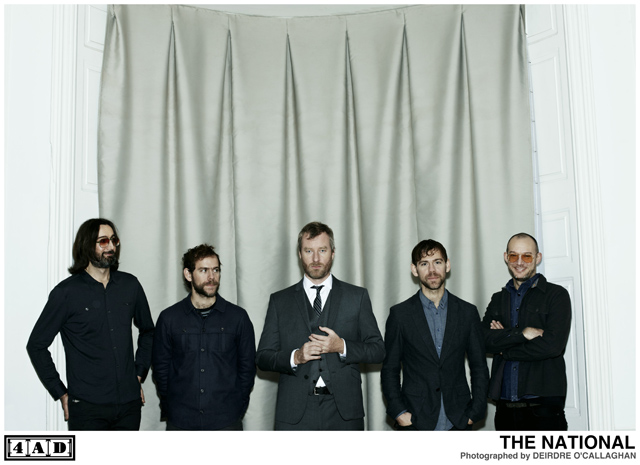
The National has been praised by fans, critics, and rock legends since the
breakout success of its 2010 album High Violet
“I was walking through the mud, stepping over these wires at this rainy festival, and when I looked up, I saw a man heading my way. And at a hundred yards away I realized it was Leonard Cohen,” Matt says of the debonair Canadian folk vet, famed for his immaculately cut suits and his husky voice, both of which are obvious influences for The National singer. Matt adds of his fellow baritone: “He was dressed just impeccably, such an elegant classy man, and he was wearing one of his fedoras. Seeing him in the flesh, just walking through mud, was kind of an awe inspiring moment.”
As they crossed paths, Matt Berninger didn’t quiz Cohen about his inspirations. Nor did he ask for career advice. Instead, the elder songwriter locked eyes with the younger indie darling, and said simply: “Nice hat,” before walking on, all without breaking stride.
“We were like ships in the night,” Matt says with a chuckle. “It was just one of those tiny moments, since we’ve hit it big, that I’ll never forget. He might’ve been paying me a compliment, but I think he was just being kind about my stupid hat.”
Since then, rock n’ roll giants like Paul McCartney have tweeted about loving Trouble Will Find Me, and U2 masterminds The Edge and Bono spontaneously invited Berninger’s bandmates to share the stage in a Dublin dive bar, which The National frontman missed out on because he was fast asleep on the tour bus. It’s the sort of wish fulfillment that has always been beyond Matt’s wildest dreams.
Tom Berninger, on the other hand, saves such reverence for horror directors like Eli Roth. It’s just one of the many things that set he and his brother apart.
“I like horror movies. Matt and his wife like to watch romantic comedies together,” Tom says with a laugh, before adding that the differences between he and his brother may lead to misunderstandings, but never to total disdain. He goes on to refute one of Matt’s claims in Mistaken for Strangers: “It’s not that I think indie rock is pretentious bullshit, like Matt said in the documentary. It’s just that, when I listen to music, I want whatever’s inside me to explode. I want it to make me feel greater than what I am.”
Eventually indie rock gave Tom that galvanizing feeling, and so much more. Shooting a documentary about one of the genre’s giants has led to the biggest opportunities of his life. Mistaken for Strangers left critics raving at its Tribeca Film Festival debut this past spring. Now Tom has finally achieved his dream of becoming a filmmaker (although not in the horror genre, as was his plan since boyhood). He shot the film after Matt hired him as a roadie for the High Violet tour in 2011. The younger brother says that backstage access made for an intimate film that has not only been a revelation for audiences, but also for the man behind the camera.
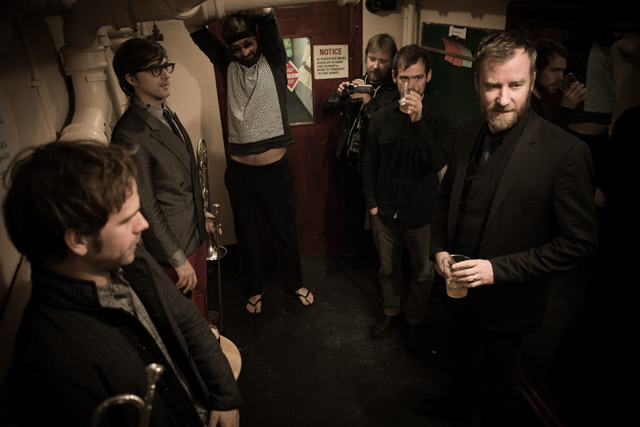
The National during 2011’s High Violet tour. Tom Berninger (third from the right), brother of singer Matt (first on the right), accompanied the band as a roadie and rookie filmmaker
In an interview with Grantland, Tom said The National’s music grew on him immensely after he joined their tour. He’s especially fond of the band’s brawnier, less melancholy tunes like “Mistaken for Strangers,” (so much so that he named his documentary after that song). Tom adds: “I like it because my brother, he sings like a dude … Even though they do have poppy songs and rock songs, they’re heavier.”
That quote made Matt laugh. The singer adds that he was glad to clear up any of his brother’s indie misconceptions.
“He thought a lot of it was sort of fake. When he thought of indie rock he thought of men singing with high voices or something,” Matt says, adding: “I’m glad that he saw us and thought, ‘At least my brother sings and screams like a man in his band.’ It’s a silly thing to say, but I like that he said it.”
Tom chuckles at the comment now, although he meant for it to sound slightly more eloquent.
“Matt has a cool rock n’ roll vibe. That’s what I love about metal, metal showmanship. Matt has great showmanship,” Tom says, adding that newfound appreciation also comes from seeing his brother’s work ethic. “Watching him and seeing that it doesn’t come easily for him, that he wasn’t the perfect guy that got lucky all the time, that he worked hard and had bad shows, it all made me see my brother as much more of a person.”
Matt agrees that Tom’s recent compliments stem from something deeper than the singer’s “dude-ly” voice.
“When he came on tour and made the movie, he saw the darkness and the mayhem, the same sort of loud cathartic expression, that happens in metal,” Matt says of The National performances that finally made Matt think twice about indie rock. “It made Tom think ‘Oh my brother’s like that too, just maybe in a different way.’ He very much appreciates that about me now, more than he did before.
I defend my family
With my orange umbrella…
Little voices swallowing my soul…
—“Afraid of Everyone”
The indie “darkness and mayhem,” that Matt refers to may not live up to heavy metal’s Ozzy Osbourne, bat decapitating heyday. But life on the road is also gruesome and dreadful for The National, in its own way.
Before High Violet reached the Billboard summit, before one of the Beatles was tweeting about his love for Trouble Will Find Me, and before they were headlining festivals in Japan, The National were just another underground band, struggling for survival. The band’s earlier releases had been critical successes, but that feat alone often seemed small, especially compared to the steep toll that recording and touring took on Berninger and the others. He and guitarist Aaron Dessner would often tear into crazed arguments about a guitar chord, or even more minute issues. Of course, the subtext of that bickering ran much deeper.
“In reality that kind of fight was always about something else,” Matt says, before elaborating: “It’s the creative tensions and ego tensions of five men trying to make one thing together, then living on a bus together and night after night trying to perform. It makes for all kinds of issues.”
The worst problem of all had nothing to do with the music. In fact, the biggest hurdle in the studio, or the grandest onstage successes, seemed trivial to Matt every time he had to walk out the front door. That’s because leaving his house for work meant not seeing his daughter again until the weeks of touring ceased.
“There were times then when I was thinking, ‘I don’t know if this is worth it. I need to be home to be a father,’” Matt says of his daughter Isla, who is five now, but was only an infant when The National first hit its stride. Matt adds that his bandmates had trouble empathizing with the situation: “The other guys in the band didn’t have kids at the time, and they didn’t understand what was going on with me. There was no way they could have. But they had patience, and now most of the other guys have kids, and they’re going through that same crisis in one way or another.”
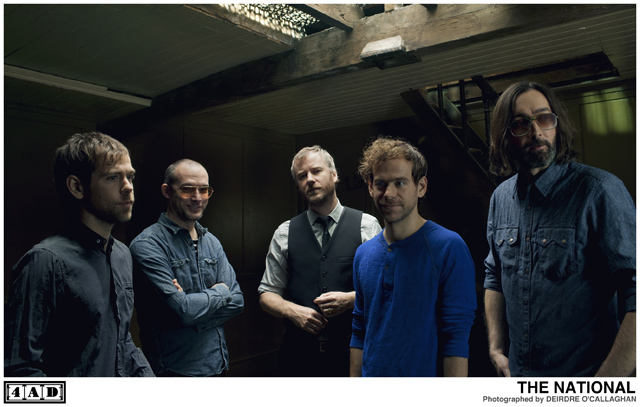
After ripening into middle age and releasing six albums, the members of The National have finally outgrown the angst and self-doubt that plagued their early tours.
But those tensions have eased since Matt first became a father. At the height of his frustration, his bandmates agreed to shorter touring stretches—a move that they are now more than grateful to take advantage of themselves. It has helped them become better fathers and better husbands, and given them a more positive outlook about their band. Of course, it’s harder to be pessimistic when you’re rubbing shoulders with the likes Leonard Cohen and U2.
“We stopped doubting ourselves. We have the perspective of success now; we’re more confident about what we do. But we’ve also embraced the fact that we fight a lot,” Matt says, adding that those arguments are easier to endure after all the summits and lulls the band has traversed. He adds: “It’s like before you’re married, and during every fight with your girlfriend, you worry if it’s is going to be the break up. We’ve been though so many of those fights, we realize now it’s just part of the chemistry of our band.”
Like any marriage, or any family, The National’s bond has only grown stronger after all those years of pressure. It’s made those fellow musicians feel like blood relatives to Matt, even though he’s the only member of the band who doesn’t share an actual genetic link. The rest of The National is comprised of twins Aaron (guitar and keyboard) and Bryce Dessner (guitar), and another pair of brothers—Scott (bass) and Bryan Devendorf (drums).
“After a while it made me realize how great it was to go though this experience of traveling the world as family,” he says of touring with those siblings, an experience that gave him another important revelation: “I very much missed my brother.”
Oh, when I lift you up
You feel like a hundred times yourself
I wish everybody knew
What’s so great about you
Oh, but your love is such a swamp
You don’t think before you jump
And I said I wouldn’t get sucked in…
—“This is the Last Time”
Matt’s sentimentality, after years of playing in a band of brothers, was a fitting reason for him to invite Tom on tour. But that didn’t occur to the younger Berninger.
“He wanted to bring me on tour, and get to know me a lot more than I wanted to get to know him. He was curious of my generation,” Tom says, adding that Matt was lucky enough, and old enough, to take advantage of the dotcom boom at the turn of the century. After studying graphic design in college, the senior Berninger snagged a swanky job in New York. Things were different for Tom, who was nine years younger and inherited a recession instead. “My generation was where the whole bottom dropped out. I think Matt was just curious about where I was in life, and the choices I made. I also think he feels a tad guilty, and wonders what it would’ve been like to be closer than me.”
Matt agrees with that last part. Everything preceding it, Tom’s “generation curiosity,” sociological, pompous depiction, may have been based on previous experience. But this time, it wasn’t the case.
“Tom graduated from college in Cincinnati, and then was just on a holding pattern there,” Matt says of his little brother’s quarter-life crisis, after finishing film school and failing to find work as a horror auteur. “I thought it would be good for him to get out of the rut he was in, and I missed him. So bringing him on tour was very much me trying to make up for not being there.”
But, at first, the plan did little to mend their strained ties. Quite the opposite, in fact. Tom had been hired as a roadie, and was given free reign to film the band and create an amateur documentary. After awhile, everyone had grown so accustomed to him hanging around that they hardly noticed his camera.
Eventually, his roadie duties fell through, after he partied too hard and butted heads with the crew. They kicked Tom off their bus, and he spent the duration of the tour on the band’s bus. This greater proximity would have thrilled any other documentarian, but Tom was disappointed because the musicians were mellowed family men, and the roadie bus partied harder. Regardless, he had nothing but spare time at that point, which he devoted to questioning the band incessantly.
This lead to the film’s most stinging moment. Tom cautiously, but earnestly, tells Matt: “I feel like the only reason why they think I’m on tour is because I’m your brother.” To which the elder Berninger deadpans: “The only reason you are here is because you’re my brother.”
Matt admits that he could have handled the situation better.
“Ultimately it was chaotic; it didn’t always go well, and I reverted into some old roles,” he says of his domineering, elder-brother tendencies.
Meanwhile, Tom concedes that his brother had a point—nepotism is what got him the job.
“I was just too full of myself to realize that at times,” Tom says of his overbearing partying, interviewing and filming. “I wanted to be a rock star, or a superstar, but I wasn’t.”
Think about something so much
You should know me better than that
Start to slide out of touch
You should know me better than that
—“I Should Live In Salt”
The bickering brought Tom to tears on the film. Later, as he was editing it, Matt’s wife (a former editor and journalist), lent a hand. She kept her in-law from cutting the most embarrassing moments, and the most bitter arguments, captured onscreen. Before long, they realized that they had a special documentary on their hands, one that revealed so much more than a typical concert film.
Matt didn’t need to see the footage to know he wanted a better dynamic with his brother. They may have wounded each other on the High Violet tour, but at least they were making contact again, after years of drifting apart. The fresh bickering lead to apologies and bonding. It was cathartic, but also trying—something that Matt couldn’t have handled during The National’s earlier tours, when things were tenuous enough with his bandmates. His decision to spend more time at home with Isla, and avoid extended tours, was the best move for all of his families— the best contribution he could make as a father, a brother, and a bandmate.
“I do know that having a kid allows you to be less self conscious about things, even to the point of being more earnest or sincere,” Matt says of how his daughter—and the kind of vulnerable, unconditional love they share—is so much more fulfilling than any rock star posturing. “People are so afraid of not sounding cool, but now I’ll sing about death or love or romance with a less guarded angle. Why be afraid of anything? It sounds schmultzy but if you’re really feeling it, sing it.”
The singer had plenty of strong feelings after spending so much time with his brother on the road. Long after the High Violet shows wrapped, and it came time to pen tunes for a new album, Matt found himself dwelling on all the hurt, anger and enduring love that the pair of Berningers had unveiled on that tour.
Rather than dismiss such thoughts as distractions, Matt instead channeled them into the music. The result was “I Should Live in Salt,” a bare boned, delicately strummed and sung tune unlike anything The National had released before. Most of the synths and guitar effects that characterize the band’s more famous hits were missing from this new song. It felt exposed. And from it, the tone and inspiration for the rest of Trouble Will Find Me flowed.
“That’s a song very much about my brother, and feeling guilty,” Matt says of “I Should Live in Salt.” “I went off to college when he was still a little kid, and we’d been very close. He looked up to me so much. Then all of a sudden, I’m gone. When he was growing up and he needed me the most, I wasn’t there for him.”
Tom says much of that is true.
“My life would’ve been totally different if he’s been around. I went through underage drinking, pot, girls, all that stuff, without an older brother to give me shit about it,” Tom says, adding that he doesn’t begrudge his brother for any of those results. In fact, much of his identity stemmed from that initial loneliness—discovering heavy metal, horror movies, and dreams of a film career on his own. Now, with all that hindsight, Tom relishes reconnecting with Matt all the more, and he’s deeply moved that his big brother would commemorate it all in song.
Still, Tom has a few reservations about the results.
“The song is great, but I wish it was a friggin’ rocker,” Tom says with a laugh about “I Should Live in Salt,” which is especially hushed and tender, even by The National’s standards. “I wish it had some major riffs and power chords. I had to settle for a sad one.”
“But I was touched,” Tom adds, all kidding aside, although he admits that he was seriously taken aback by the tune. “I’d heard it lots of times, but Matt had to actually tell me it was about me. And even when I listen to it now, I’m like, ‘really?’ His lyrics aren’t usually direct, and he’ll be the first to tell you that his songs are almost always about lots of things. I guess I was also surprised because we usually don’t talk about emotions very much: we don’t get too serious.”
As of late, the brothers seem more comfortable while bonding over tunes in a chummier manner. For instance, Tom has managed to turn Matt on to Deafheaven, a rip roaring band that released last year’s most acclaimed metal album. But, in a way, Matt had little choice but to acclimatize to those heavy riffs.
“I hear it blaring all the time, from the garage behind my house,” Matt says with a laugh of the spare room that Tom has shacked up in for the time being. “I probably would not have listened to Deafheaven otherwise. So I definitely understand his world and his music more. We’ve met each other in the middle a bit.”
Tom is grateful to his brother for so much more than the free room and board. As the buzz for Mistaken for Strangers builds before its release next month, a slew of directing opportunities are opening up for him. Tom says he dreams of maybe one day travelling to Tokyo and shooting a documentary about the history of Nintendo. He also has a number of other ideas in the works.
Tom never could have imagined such events stemming from his brother’s simple invitation to join him on tour.
“It’s really validating,” he says of his newfound success, adding with a laugh that there’s still a bit of frustration underlying all that gratitude. “When I was kid, the only person who had confidence in me was my brother. Even though he was condescending on the tour sometimes, he’d still encourage me when I was filming. So he still has the upper hand in that, and keeps telling me ‘See? I told you so asshole.’ He’s still a jerk that way, and loves the fact that he was right about me.”
Arm in arm in arm and eyes and eyes glazing under
Oh, you wouldn’t want an angel watching over…
Another un-innocent, elegant fall
Into the un-magnificent lives of adults
—“Mistaken for Strangers”
The National will be headlining the Hostess Club Weekender on February 16. For more information, visit Hostess Club Weekender’s site.
Kyle Mullin is a roaming rock journalist who has contributed to music mags around the world. You can read his interviews with Iggy Pop, David Byrne and St. Vincent, Brian Wilson, Ai Weiwei and others at kylelawrence.wordpress.com. He spoke with Okkervil River and Allen Toussaint for Tokyo Weekender in October and November last year.

